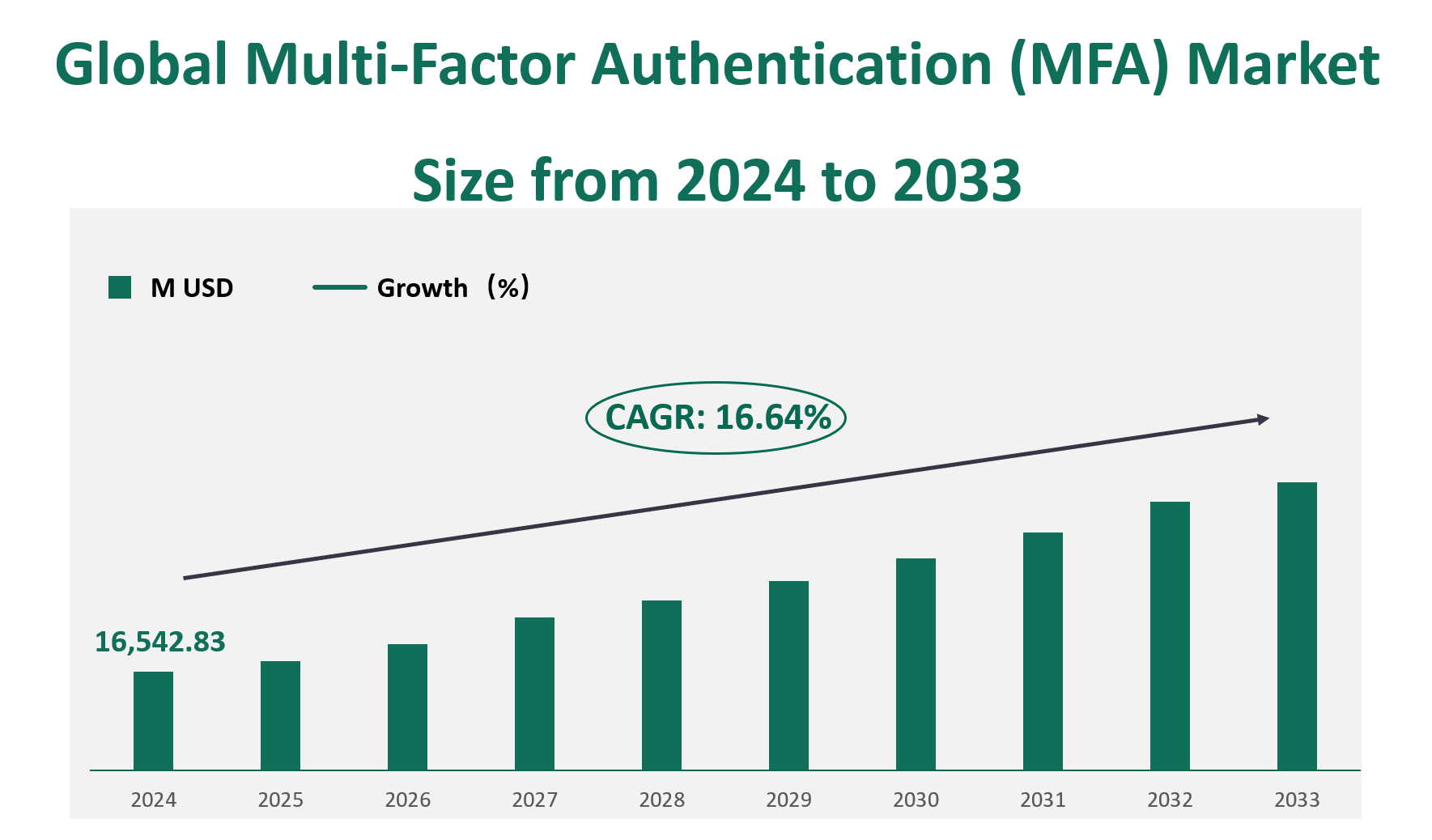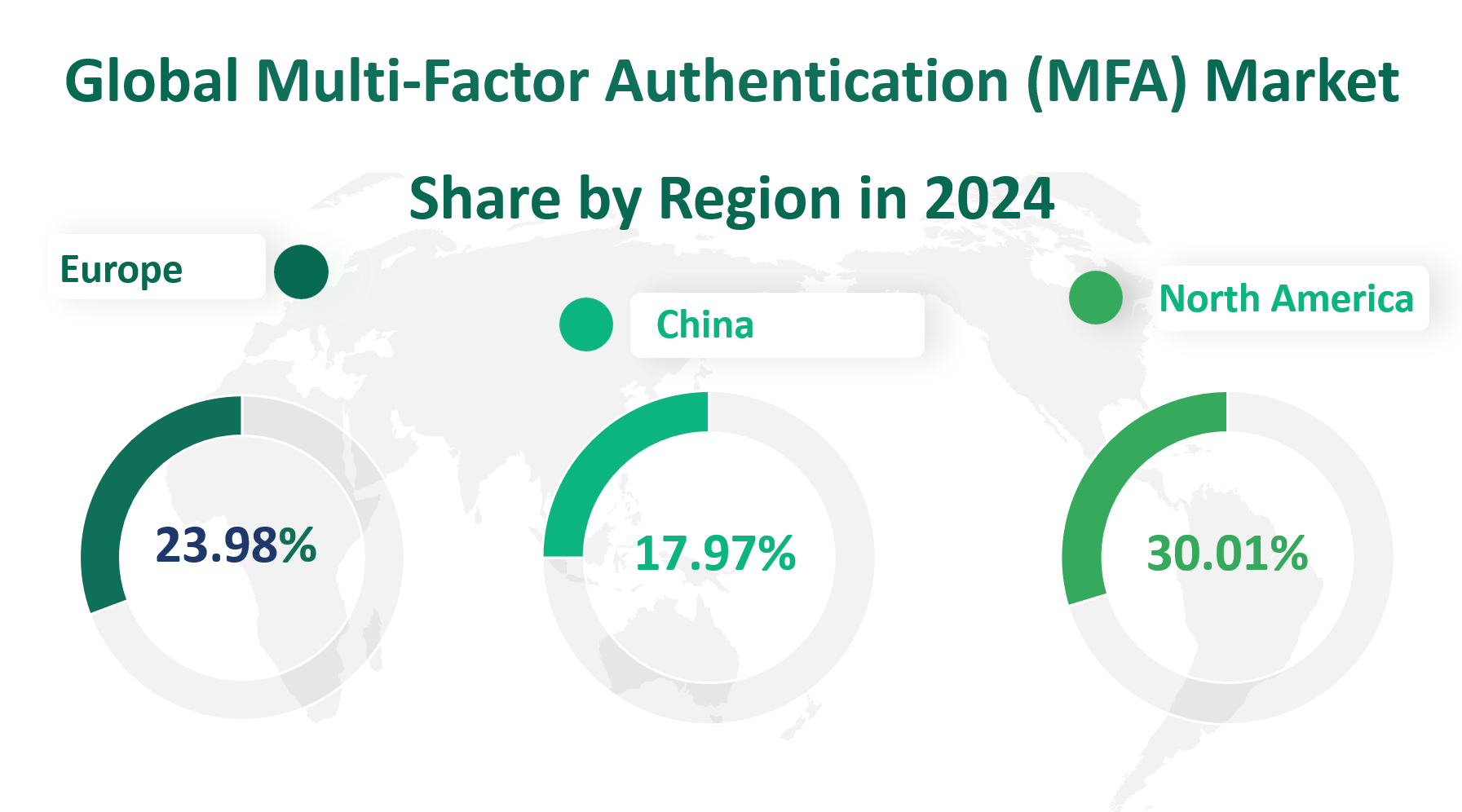1. Global Multi-Factor Authentication (MFA) Market Insight Analysis
The global Multi-Factor Authentication (MFA) market is projected to reach $16,542.83 million in 2024, with a Compound Annual Growth Rate (CAGR) of 16.64% from 2024 to 2033.
Multi-Factor Authentication (MFA) is a security system that requires more than one method of authentication from independent categories of credentials to verify the user’s identity for a login or other transaction. MFA combines multiple layers of security, such as something the user knows (password), something the user has (security token), and something the user is (biometric verification). This multi-layered approach significantly reduces the risk of unauthorized access compared to traditional single-factor authentication methods.
MFA has become increasingly important in today’s digital landscape, where cyber threats are on the rise. Industries such as banking, finance, healthcare, and government are particularly reliant on MFA to protect sensitive information and ensure compliance with regulatory standards. The growing adoption of cloud services and mobile devices has also fueled the need for more secure authentication methods, making MFA a critical component of modern cybersecurity strategies.
Figure Global Multi-Factor Authentication (MFA) Market Size (M USD) and CAGR (2024-2033)

2. Driving and Limiting Factors of Multi-Factor Authentication (MFA) Market
Increasing Cybersecurity Threats: The rise in cyber attacks and data breaches has heightened the need for robust security measures. MFA provides an additional layer of protection, making it more difficult for attackers to gain unauthorized access.
Regulatory Compliance: Many industries, especially finance and healthcare, are subject to strict regulations that mandate the use of multi-factor authentication to protect sensitive data. This regulatory push has driven the adoption of MFA solutions.
Growth of Digital Transactions: The increasing volume of online transactions and digital interactions has necessitated stronger authentication methods to ensure the security and integrity of these activities.
Advancements in Technology: Innovations in biometric technology, such as fingerprint and facial recognition, have made MFA more user-friendly and secure. These advancements have also expanded the range of available authentication methods.
Mobile Device Usage: The widespread adoption of smartphones has provided a convenient platform for implementing MFA solutions. Mobile applications and SMS-based authentication methods have become increasingly popular.
User Resistance: Some users find MFA cumbersome and inconvenient, leading to resistance in adopting these security measures. The additional steps required for authentication can be seen as a hindrance to productivity.
Implementation Costs: Deploying MFA solutions can be costly, especially for small and medium-sized enterprises. The costs associated with hardware tokens, software licenses, and integration with existing systems can be prohibitive.
Technical Challenges: Implementing MFA can be technically complex, requiring significant IT resources and expertise. Organizations may face challenges in integrating MFA with their existing infrastructure.
False Positives: In some cases, MFA systems may generate false positives, leading to legitimate users being denied access. This can cause frustration and reduce user confidence in the system.
Vendor Lock-in: Some MFA solutions are proprietary, leading to vendor lock-in and potential issues with interoperability. This can limit the flexibility of organizations to switch providers or integrate multiple solutions.
3. Technology Innovation and Corporate Mergers and Acquisitions in Multi-Factor Authentication (MFA) Market
Biometric Authentication: The integration of biometric technologies such as fingerprint, facial, and voice recognition has significantly enhanced the security and convenience of MFA. These methods provide a high level of accuracy and are difficult to replicate.
AI and Machine Learning: Advanced analytics and machine learning algorithms are being used to detect anomalies and potential threats in real-time. This enables adaptive MFA systems to adjust security measures dynamically based on user behavior and context.
Cloud-Based MFA Solutions: Cloud-based MFA platforms offer scalable and cost-effective solutions for organizations. These platforms can be easily integrated with existing systems and provide centralized management capabilities.
Mobile Authentication Apps: The development of mobile authentication applications has made MFA more accessible and user-friendly. These apps leverage the ubiquity of smartphones to provide secure and convenient authentication methods.
Thales Acquisition of Gemalto: In 2019, Thales completed the acquisition of Gemalto, creating a global leader in digital identity and security. This strategic move combined Thales’ expertise in cybersecurity with Gemalto’s digital security solutions, enhancing their combined market position.
Morpho’s Acquisition of Top Data Science Ltd.: Morpho, a leader in image processing solutions, acquired a majority stake in Top Data Science Ltd. This acquisition aimed to drive innovation in computer vision and AI, further strengthening Morpho’s capabilities in biometric authentication.
Symantec’s Integration with Broadcom: Symantec’s enterprise security products are now part of Broadcom, leveraging Broadcom’s infrastructure technology to enhance their MFA solutions. This integration has expanded the range of security offerings available to customers.
4. Global Multi-Factor Authentication (MFA) Market Size by Type
The MFA market is segmented into two primary product types: Physical Tokens and Mobile Applications.
Physical Tokens are hardware devices that generate one-time passwords (OTPs) or other authentication codes. They are widely used in industries requiring high security, such as banking and government sectors. Physical tokens can be in the form of key fobs, smart cards, or USB devices.
On the other hand, Mobile Applications leverage smartphones or other mobile devices to provide authentication services. They offer a more convenient and user-friendly approach, often integrating with existing mobile infrastructure. Examples include Google Authenticator, Microsoft Authenticator, and other third-party apps.
Physical Tokens are expected to reach US 4474.04 million in 2024. Mobile Applications are US 12068.79 million, accounting for over 72.95% of the MFA market in 2024.
First, mobile applications leverage the widespread use of smartphones, making them highly accessible to users. This convenience factor significantly enhances user adoption rates. Second, compared to physical tokens, mobile applications are generally more cost-effective to deploy and manage. They eliminate the need for physical hardware, reducing procurement and maintenance costs. Third, mobile applications often offer advanced features such as push notifications, biometric authentication (fingerprint or facial recognition), and integration with other security solutions.
Table Global Multi-Factor Authentication (MFA) Market Size by Type in 2024
|
Market Size (M USD) 2024 |
Market Share | |
|
Physical tokens |
4474.04 |
27.05% |
|
Mobile applications |
12068.79 |
72.95% |
5. Global Multi-Factor Authentication (MFA) Market Size by Application
The Banking and Finance sector is one of the most critical areas where MFA is extensively used. This application involves securing access to online banking platforms, mobile banking apps, and other financial services to prevent unauthorized access and protect sensitive financial transactions. The Banking and Finance application is expected to have a market size of US$ 4765.87 million in 2024.
The Government application involves securing access to government databases, online services, and other sensitive information systems. MFA is crucial for preventing unauthorized access to government data and ensuring the integrity of government services. The Government application is projected to have a market size of US$ 901.55 million in 2024.
The Travel and Immigration application includes securing access to travel-related services, immigration databases, and border control systems. MFA helps in verifying the identity of travelers and ensuring secure access to travel-related information. The market size for this application is forecasted to be US$ 964.68 million in 2024.
The Military and Defense application involves securing access to military systems, defense databases, and other sensitive defense-related information. MFA is essential for ensuring the security and integrity of military and defense operations. The market size for Military and Defense is expected to be US$ 616.15 million in 2024.
The Commercial Security application includes securing access to corporate networks, enterprise applications, and other commercial systems. MFA helps in protecting sensitive corporate data and ensuring secure access to business-critical applications. The market size for Commercial Security is projected to be US$ 2573.17 million in 2024.
The Consumer Electronics application involves securing access to consumer devices, such as smartphones, tablets, and laptops. MFA helps in protecting personal data and ensuring secure access to consumer electronics. The market size for Consumer Electronics is forecasted to be US$ 3047.70 million in 2024.
The Healthcare application includes securing access to electronic health records, medical databases, and other healthcare-related systems. MFA is crucial for protecting patient data and ensuring the security of healthcare services. The market size for Healthcare is expected to be US$ 3308.72 million in 2024.
Table Global Multi-Factor Authentication (MFA) Market Size by Application in 2024
|
Application |
Market Size (M USD) 2024 |
Market Share |
|
Banking and Finance |
4765.87 |
28.81% |
|
Government |
901.55 |
5.45% |
|
Travel and Immigration |
964.68 |
5.83% |
|
Military and Defense |
616.15 |
3.72% |
|
Commercial Security |
2573.17 |
15.55% |
|
Consumer Electronics |
3047.70 |
18.42% |
|
Healthcare |
3308.72 |
20.00% |
|
Others |
364.98 |
2.21% |
6. Global Multi-Factor Authentication (MFA) Market by Top Regions
North America is expected to remain the largest market for MFA in 2024, with a market size of $4,964.97 million. The region’s market share is projected to be 30.01%. North America’s dominance in the MFA market can be attributed to its advanced technological infrastructure, high adoption of cloud services, and stringent regulatory requirements for data protection. The region is also home to many leading technology companies that drive innovation in MFA solutions.
Europe’s MFA market is expected to reach $3,966.46 million in 2024, accounting for 23.98% of the global market. The region’s market is expected to grow at a CAGR of 16.31% from 2024 to 2033. Europe’s MFA market is driven by strong regulatory frameworks such as GDPR, which mandate robust security measures for data protection.
China’s MFA market is experiencing rapid growth and is expected to reach $2,972.96 million in 2024. The region’s market share is projected to be 17.97%.
Japan’s MFA market is expected to reach $1,156.81 million in 2024, with a market share of 6.99%. Japan’s market is characterized by a high level of technological adoption and a focus on secure authentication methods in both the public and private sectors.
Southeast Asia’s MFA market is expected to reach $568.03 million in 2024, with a market share of 3.43%.
India’s MFA market is expected to reach $832.27 million in 2024, with a market share of 5.03%.
Figure Global Multi-Factor Authentication (MFA) Market Size by Region in 2024

7. Global Multi-Factor Authentication (MFA) Market Analysis by Major Players
Gemalto, a Thales company, is a global leader in digital security, bringing trust to an increasingly connected world. The company designs and delivers a wide range of products, software, and services based on digital identification and data protection. Gemalto’s MFA solutions include mobile workforce security and secure VPN access, providing flexible service delivery and simplified authentication management.
Symantec Corporation, now part of Broadcom, offers a range of enterprise security products. Symantec’s MFA solutions include a variety of authentication methods such as push notifications, risk-based authentication, SMS, biometrics, and hard tokens. These solutions can be easily integrated with corporate resources like VPNs and cloud applications.
RSA Security, a part of the Dell Technologies family, provides comprehensive security solutions, including RSA SecurID Access. This solution offers a broad range of authentication methods, including modern mobile multi-factor authenticators and traditional hard and soft tokens. RSA’s solutions are designed to provide secure access to applications, whether on-premises or in the cloud.

